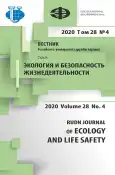Ecological consciousness of the XXI century human and the ways of its verbalization in the media discourse environment
- Authors: Guslyakova A.V.1,2, Guslyakova N.I.3, Valeeva N.G.1
-
Affiliations:
- Peoples’ Friendship University of Russia (RUDN University)
- Moscow State Pedagogical University
- South Ural State Humanitarian Pedagogical University
- Issue: Vol 28, No 4 (2020)
- Pages: 370-380
- Section: Environmental education
- URL: https://journal-vniispk.ru/2313-2310/article/view/323903
- DOI: https://doi.org/10.22363/2313-2310-2020-28-4-370-380
- ID: 323903
Cite item
Full Text
Abstract
The paper aims at studying and analyzing the language implementation of the development of people’s ecological consciousness in the present-day Russian and English-speaking media discourse environment. The modern media discourse has become an important source of various environmental lexical units which can affect people’s consciousness and change their behavior in a more eco-friendly way. The research is based on two parallel and opposite scientific approaches integrated in the media discourse which are ecologisation and anthropocentrism. The study is built on the analysis of the language models of ecological issues in different popular national and international media editions of Russia and English-speaking countries; in TV documentaries; on YouTube channels; in eco-friendly bloggers’ speeches and texts. The findings of the research showed that the media discourse environment is actively inculcating “green” ideas into people’s consciousness today both in Russia and abroad. More people are trying to follow the conscious consumption lifestyle. The media language is also becoming an important tool in introducing new environmental lexical units - neologisms - which are easily disseminated in the media discourse space and are actively being adopted by society. Overall, this research has confirmed the idea that the present-day language of the media discourse space is a powerful mediator of a new life sustainable development philosophy which helps human consciousness evolve in an eco-friendly way and try to make our planet a safer, healthier and more comfortable place for living.
About the authors
Alla V. Guslyakova
Peoples’ Friendship University of Russia (RUDN University); Moscow State Pedagogical University
Author for correspondence.
Email: aguslyakova@bk.ru
PhD in Philology, Associate Professor, Department of Foreign Languages, Ecological Faculty
6 Miklukho-Maklaya St, Moscow, 117198, Russian Federation; 1 Malaya Pirogovskaya St, bldg 1, Moscow, 119435, Russian FederationNina I. Guslyakova
South Ural State Humanitarian Pedagogical University
Email: guslyakovani@cspu.ru
Doctor of Sciences (Psychology), Professor, Department of Technology and Psychological and Pedagogical Disciplines, Faculty of Science and Technology
69 Prospekt Lenina, Chelyabinsk, 454080, Russian FederationNailya G. Valeeva
Peoples’ Friendship University of Russia (RUDN University)
Email: ngvaleeva@yandex.ru
PhD in Pedagogics, Professor, Head of the Department of Foreign Languages, Ecological Faculty
6 Miklukho-Maklaya St, Moscow, 117198, Russian FederationReferences
- Dale A, Hill SB. Biodiversity conservation: a decision-making context. In: Dale A, Robinson J. (eds.) Achieving Sustainable Development. Vancouver, BC: University of British Columbia; 1996. p. 97-118.
- Brand K-W. Environmental consciousness and behaviour: the greening of lifestyles. In: Redclift MR, Woodgate G. (eds.) The International Handbook of Environmental Sociology. Edward Elgar Publishing; 1997. Available from: https://www.elgaronline.com/ view/9781858984056.00023.xml (accessed: 08.10.2020).
- Polonskiy AV. Cultural status of media text. Media Linguistics. 2016;1(11):7-18. (In Russ.) Available from: https://medialing.ru/kulturnyj-status-medijnogo-teksta/ (accessed: 08.10.2020).
- McLuhan M. Understanding media: the extensions of man. McGraw-Hill; 2003.
- Milovzorova MN. Mass media as a tool for manipulation of consciousness. Nauchnoye Mneniye. 2014;(7):76-79. (In Russ.)
- Maceviciute A. The influence of the media on the development of publics environmental consciousness: case study of Lithuanian press. Masters Thesis. Lund University; 2000. Available from: https://www.lumes.lu.se/sites/lumes.lu.se/files/maceviciute_ausra.pdf (accessed: 01.10.2020).
- Sergeychik YeM. New media: the revolution of consciousness. Russian Journal of Philosophical Sciences. 2016;(3):14-23. Available from: https://www.phisci.info/jour/article/ view/139/140 (accessed: 05.10.2020).
- Graddol D. (ed.) Applied Linguistics for the 21st century. The AILA Review 14. 2001. Available from: https://core.ac.uk/download/pdf/14515194.pdf#page=55 (accessed: 05.10.2020).
- Khryapchenkova Fischer O. Language and environmental consciousness of society: the situation in Russia. Available from file:///D:/Downloads/KhryapchenkovaSept2015 Final%20(6).pdf (accessed: 30.09.2020).
- Panov VI. Ecological thinking, consciousness, responsibility. V Congress of Russian Psychological Society. Procedia - Social and Behavioral Sciences. 2013;86:379-383. Available from: https://www.sciencedirect.com/science/article/pii/S1877042813027146? via%3Dihub (accessed: 03.10.2020).
- Deryabo SD, Yasvin VA. Ecological pedagogy and psychology. Rostov-on-Don; 1996. (In Russ.)
- Panov VI. Ecological psychology: experience of construction methodology. Moscow; 2004. (In Russ.)
- Zahed H. The power of spoken words. HuffPost. 15th December 2014. Available from: https://www.huffpost.com/entry/the-power-of-spoken-words_b_6324786#:~:text=%E2 %80%9CWords%20are%20singularly%20the%20most,to%20humiliate%20and%20to%20humble.%E2%80%9D4.Conclusions (accessed: 06.10.2020).
- Packham Ch. We are full of bright ideas to solve ecological problems. So let’s act on them. The Guardian. 6th May 2019. Available from: https://www.theguardian.com/ commentisfree/2019/may/06/ecological-problems-environmental-crises-farmers-citizenspoliticians (accessed: 07.10.2020).
- RAS: toxic algae could lead to ecological disaster in Kamchatka. Novaya Gazeta. 11th October 2020. (In Russ.) Available from: https://novayagazeta.ru/news/2020/ 10/11/164841-ran-k-ekologicheskoy-katastrofe-na-kamchatke-mogli-privesti-toksichnye-vodorosli (accessed: 06.10.2020).
- Radov Z. By the middle of the century, the number of animals on Earth will sharply decrease. Komsomol'skaya Pravda. 7th August 2015. (In Russ.) Available from: https://www.dv.kp.ru/daily/26416/3290112/ (accessed: 30.09.2020).
- Milenina Yu. Stop ecoterrorism! Omsk people continue to poison with harmful emissions. Argumenty i Fakty. 31st July 2019. (In Russ.) Available from: https://omsk.aif.ru/ health/ostanovit_ekoterrorizm_omichey_prodolzhayut_travit_vrednymi_vybrosami (accessed: 29.09.2020).
- Conscious consumption is in fashion. How is Street Style week at VDNKh. 24th August 2019. (In Russ.) Available from: https://www.mos.ru/news/item/60862073/ (accessed: 29.09.2020).
- Minakova A. Compliance with the norms of ethics and environmental protection presupposes changes. Kommersant. 19th July 2019. (In Russ.) Available from: https://www.kommersant.ru/doc/4034721 (accessed: 02.10.2020).
- Kolb E, Stebbins S. Countries doing the most (and least) to protect the environment. USA Today. 14th July 2019. Available from: https://www.usatoday.com/story/money/ 2019/07/14/climate-change-countries-doing-most-least-to-protect-environment/39534413/ (accessed: 02.10.2020).
- Lindell J. Young photographers’ eyes on environment celebrated. The Canberra Times. 11th October 2020. Available from: https://www.canberratimes.com.au/story/6962679/ young-photographers-eyes-on-environment-celebrated/?src=rss (accessed: 14.10.2020).
- Barnard A. Freegans: diving into the wealth of food waste in America. Minneapolis, MN: University of Minnesota Press; 2016.
- Wayne G. Among the new words. American Speech. 2004;79(2):194-200.
- Dmitriyeva O. Trash haute couture. Dressing from a landfill has become fashionable not only in Moscow, but also in New York. Rossiyskaya Gazeta. 9th December 2005. (In Russ.) Available from: https://rg.ru/2005/12/09/pomojki-pitanie.html (accessed: 05.10.2020).
Supplementary files









